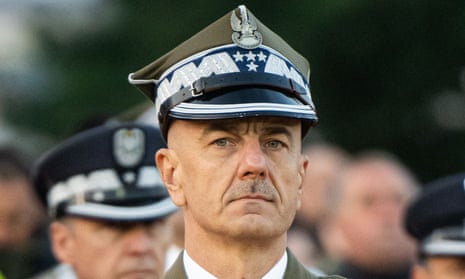Vladimir Putin’s “gangster”-like nuclear threats require Nato to adopt a much more aggressive response, including flying more aircraft with nuclear weapons, the chief of the general staff of the Polish armed forces urged on Tuesday.
Gen Rajmund Andrzejczak also said he did not think North Korea would be preparing to sell weapons to Russia without the agreement of China.
“I don’t believe North Korea is strong enough or so free to make such an offer, so maybe it is testing our determination, attention and political will, but what is even more important is what China says about this than the North Korean leadership.”
Washington briefed this week that it believed Putin was preparing to buy weapons from Pyongyang.
Andrzejczak also predicted that Russia would try to create a crisis in next month’s Polish election but gave no details in public. He warned that Russia was on a permanent war footing and was “very much active in Poland, looking for some gaps in the system, trying to interfere in the media”.
Andrzejczak also warned that if Ukraine lost the war and Belarus went further into Russia’s orbit, Poland would find that limiting defence spending to 5% of its gross domestic product and a standing army of 300,000-strong would not be enough. “If we lose credibility as Nato, as a civilisation, China is watching, so this is a big game,” he said.
He was speaking at the Karpacz Economic Forum in Poland, during which he urged his audience to think of the long-term economic cost of Ukraine’s military defeat.
Referring to the repeated Russian threats to use nuclear weapons and the stationing of Russian tactical nuclear weapons in Belarus, Andrzejczak likened Russia to a gangster bringing guns to the table, and said the west by comparison was arriving unarmed in a panama shirt.
He said: “It looks like we are dealing with the gangsters, crazy bad boys. Everyone has gone to the park smoking cigars, the gangsters are putting guns on the table and we are in panama T-shirts and saying: ‘Well, I have got a gun, but I left mine at home, and my wife does not like the word.’
“Nato is a nuclear treaty organisation; it should be much more proactive and stronger to the Russians.
“In the 70s and 80s, 30% of B-52 bombers were flying permanently and had nuclear weapons with pilots ready to act. Today we have a challenge to say the word B61 [the primary US thermonuclear gravity bomb], so let us change narratives.
“What is wrong with us? Russia is still the same and we have a situation in a neighbouring country where Russia is saying publicly it is putting nuclear systems in Belarus and what are we doing in our panama T-shirt?
“I don’t want to escalate too much, but what is wrong with our vocabulary? Nato is a nuclear organisation. Full stop.”
after newsletter promotion
He said there had been complete silence since Poland’s president, Andrzej Duda, asked to join Nato’s nuclear sharing programme owing to the deployment of Russian nuclear missiles to Belarus.
Nuclear sharing is part of Nato’s policy of nuclear deterrence, which allows member countries without nuclear weapons to take part in planning for their use by Nato. The weapons are hosted by certain countries but remain under the control of the US.
Andrzejczak also questioned whether Nato had decided what to do about an attack on Nato territories mounted by the Wagner group, including whether it would invoke its Article 5 self-defence clause by attributing the attack to Russia.
He asked: “Who is the Wagner group today? Is it a national action by Russia or, as the Russian minister of defence says, just a private military company? Is it enough for Article 5?”
He said the issue was very sensitive for Poland because “we have no time and no space”.
“We are facing a direct border with Kaliningrad and Belarus. This is not cold war 2.0 any more,” he added.
